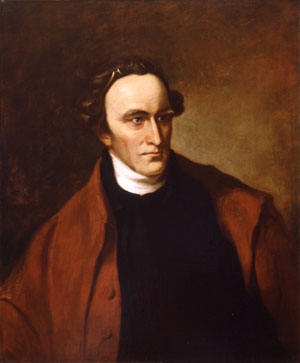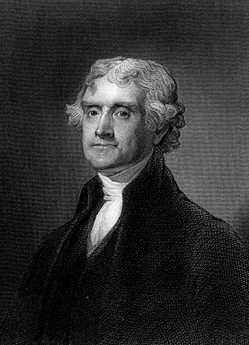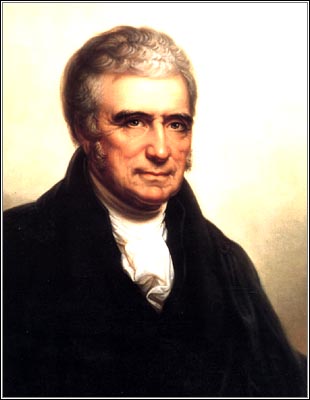Related Topics
Constitution and Civil War
The Thirteenth Amendment abolished slavery (and involuntary servitude, except as punishment for a crime). It was passed by the Senate on April 8, 1864, and by the House on January 31, 1865.
John Marshall's Constitution

|
| Patrick Henry |
The best way to remind Americans, especially skeptical ones, of the unique value of our Constitution is to ask a question. "Can you name a single other examples in all recorded history where thirteen nations peacefully gave up sovereign power to become one unified nation?" No, but it took two hundred years of failures of similar attempts, to demonstrate the American achievement. The U.N. and the European Union are recent examples of other failed attempts to conciliate and unify; the French Revolution was an early botched one. With few exceptions, unions are unified at swords point. This dismal record exists in spite of abundant evidence that most nations are too small to prosper; it seems to be necessary to beat people over the head to make them agree to be prosperous. Even so, ratifying our unification was a close call, hotly resisted by notables like Patrick Henry and Thomas Jefferson.

|
| Thomas Jefferson |
Many historians conclude our Constitution was merely lucky, could not have been accepted at any other time, except immediately following a shared revolt against high-handed misrule. During that eight-year war, the follies of ruinous inflation, unenforceable contracts, drum-head justice and inability to collect taxes -- the collective anarchies of feeble government -- were everyday observations. America wanted to rid itself of a king, but it was plain that without that remarkable man, George Washington, peace and prosperity were inconceivable. In short, America had just felt the consequences of the many choices it would need to avoid, so in 1787 we avoided them. A much-criticized decision was made by the founders to avoid the slavery issue and a good thing we did. Eighty years later we still had to fight our bloodiest war, just to hold that Union together. The industrialized North did not go to war to free slaves. It fought to preserve a dynamic Union of expanding states. Even The South was not defending slavery so much as struggling to preserve a place in this new world until it could find some plausible way to escape its antiquated life support. That is not easy to do under a system of majority rule.
Although the Constitution enshrines majority rule, the American Union is held together with the glue of decent respect for minority viewpoints. That's fragile glue, indeed. In any unavoidable collision of interests, the main argument for still leaving the Constitution untouched is not respect for Original Intent. It is fear this unique accomplishment will disintegrate if tinkered with.

|
| John Marshall |
Three other introductory points need to be made, about John Marshall, about Philadelphia, and about the evolution of common law into statutory law. The Constitution we know did not emerge complete from the 1787 Convention, or even after the first Congress produced the Bill of Rights in 1791. John Marshall, who did complete it, was not even the first Chief Justice. Nevertheless, almost alone he forged national agreement on three essential points: 1. The Constitution is the keystone of our legal system, dominant over other authority. 2. Since the Republic began with a legal blank slate, English Common Law is the default position, but only until the Supreme Court rules on it or Congress asserts a statute. 3. The Supreme Court and only the Supreme Court may define what the Constitution means when challenged. These three unwritten axioms seemed so clear and irrefutable when Marshall deployed them, that they still stand -- because they are unchallengeable, not because they were ratified.
Finally, the rest of the nation may not be completely comfortable hearing a Philadelphian declare that our quite singular Constitution could not have emerged from any other city, as well as at any other time. The evidence to support what some may call chauvinism rests on the historically abrupt decline of American civic virtue as soon as the nation's capital moved to less utopian surroundings. Others may well have a different viewpoint, but the opinion remains that the nation survived the chaos from 1800 after the migration of the Capital from Philadelphia, until the end of Civil War -- only because we were protected by thousands of miles of ocean.
Originally published: Tuesday, March 06, 2012; most-recently modified: Monday, July 22, 2019